Mangosuthu University of Technology (South Africa)
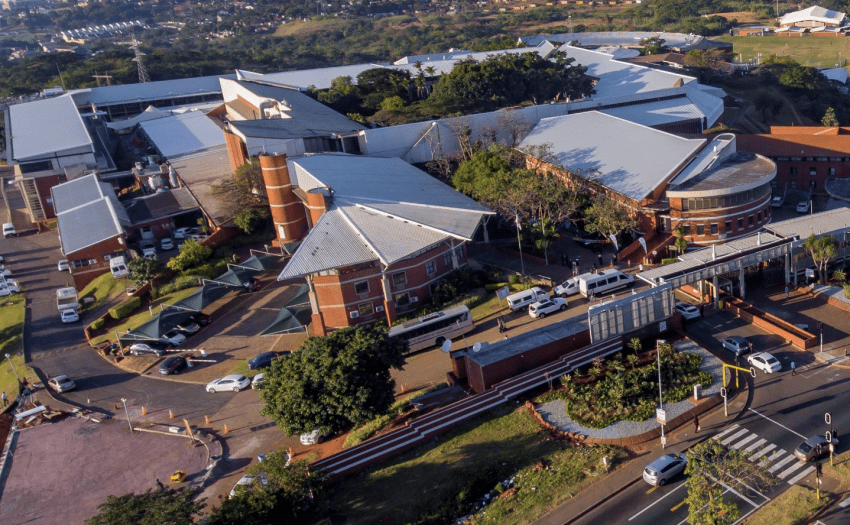
ABOUT MANGOSUTHU UNIVERSITY OF TECHNOLOGY (MUT)
Mangosuthu University of Technology (MUT) was founded in 1979 and opened its doors to its first fifteen students. The University was established against a backdrop of transforming the lives of the disenfranchised, and today that very same thread of ‘transforming’ is still the cornerstone of where the University would like to be. This has been added to the institution’s vision of ‘transforming, equitable, sustainable, academically excellent and anchored in our communities’.
MUT has three faculties: Engineering, Management Sciences and Natural Sciences. Over four decades later, MUT has a total population of about 14,500 students with a gender parity of 50/50. The University accommodates close to 90% of its student population on campus and across 43 outsourced residences. International students are accommodated in a dedicated residence, named after the acquired Executive Hotel.
The MUT Strategy 2025 has given MUT greater impetus to revitalise Umlazi Township, where it is located, through an anchor strategy. This anchor strategy will strengthen a systematic approach towards empowering Umlazi Township with relevant stakeholders. Within this context, MUT plays a critical role in national and regional development by providing the rich knowledge base, innovation, and workforce required to grow and sustain the quality of life for an increasingly diverse and rapidly changing society. The University has achieved remarkable success over its relatively brief history and has developed greater capacity to meet its responsibilities to the communities it serves. This success is enriched by MUT embracing its role as an institution serving previously disadvantaged communities.
COMMUNITY ENGAGEMENT AT MUT
Community engagement at MUT is the active involvement of the university community through its academic and support staff, students, and alumni in strategic partnerships with the broader community to enrich learning and research, prepare engaged citizens, and contribute to the public good. Community engagement values a culture of openness and access, creating value and an improved quality of life, active communication and collaboration with community stakeholders, and positive constituent services at all levels. Engagement initiatives work to transform the lives of individuals and communities through active involvement with MUT’s stakeholders by building relationships, conducting dialogue focused on common goals, and extending university knowledge, resources and expertise that contribute to the advancement of society. MUT interacts with communities in a variety of community engagement projects such as outreach projects, student volunteerism, community-based research and community development.
STUDENT VOLUNTEERISM
MUT is committed to developing the skills of students to become well-rounded graduates. Through the MUT student volunteerism programme, MUT students get immersed in activities that are outside their curricula and their comfort zone. MUT student volunteers get hands-on learning inherent to volunteer work and this gives them a competitive edge needed to enter the job market. MUT students have been involved in a variety of volunteer work which among others include participating in the Grade 12 Mentoring programme to assist grade 12 learners from a neighboring school to prepare for the grade 12 final examinations, a Reading project which helps young primary school learners develop their reading skills thus improving their confidence, and Peer helper programme in which our students help their peers who are struggling in a variety of ways such as drug abuse, early pregnancy and so forth.
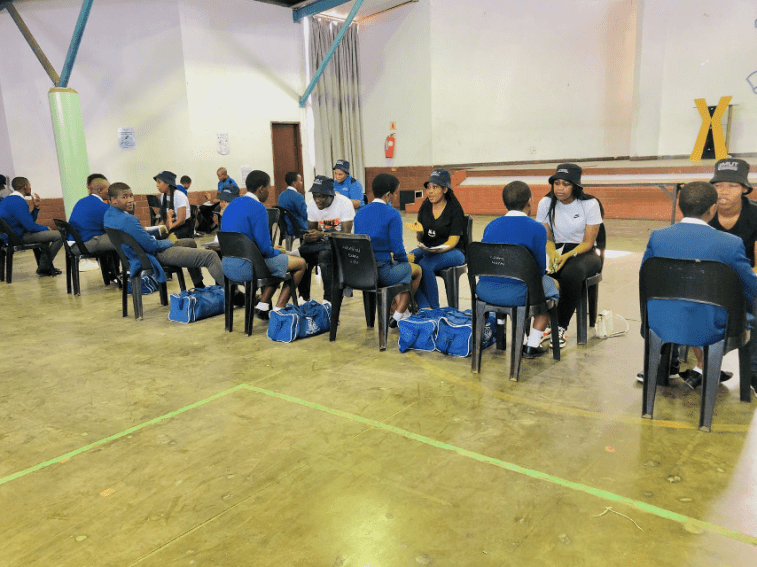
MUT student volunteers busy mentoring grade 12 learners from Umlazi Comprehensive Technical High School (COMTECH), on preparation for examinations.
MUT’S ROLE IN IMPROVING QUALITY OF EDUCATION THROUGH DIGITAL SKILLING OF LEARNERS
MUT is committed to providing quality education not only to its students but to its surrounding communities. In this regard MUT sees digital skills, such as basic computer skills, and coding and robotics, as critical in improving the quality of education of our learners and students. MUT believes that such skills are critical in developing the learners’ analytical, critical, creative, and practical skills. MUT has partnered with the Department of Science and Innovation in delivering a coding and robotics project in which four primary schools participated. The feedback from the principals of these schools is that the performance of the learners who participated in this project has improved which is testimony of the benefit of such interventions.
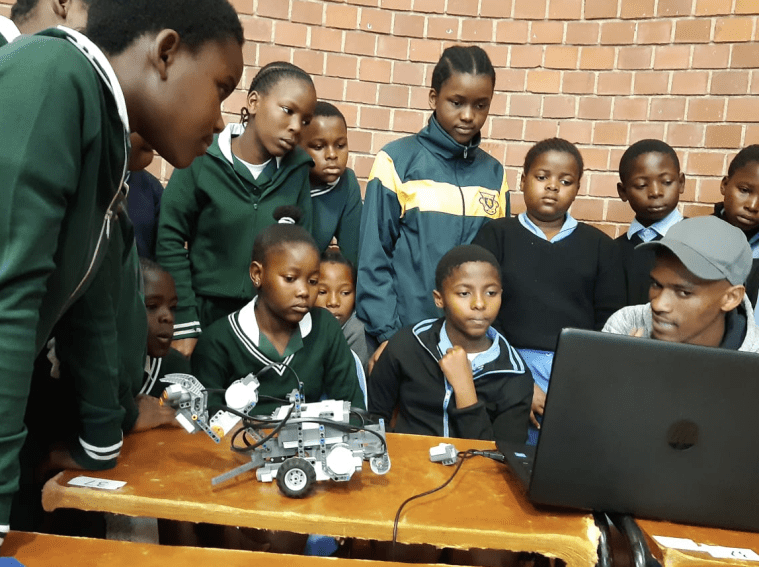
Learners from local schools who benefited from the coding and robotics project
MUT’S ROLE IN REACHING OUT TO THE DISADVANTAGED COMMMUNITIES THROUGH PROJECTS
MUT is committed to the socio-economic advancement of disadvantaged communities through various projects.
Impilo Community Project is one of MUT’s community outreach projects. Purpose: The purpose of the project is to offer basic computer skills to high school pupils residing at Impilo Home, an orphanage and home for the less privileged, located at Dassenhoek, Durban. The project has been able provide necessary computer skills to learners ranging from those who are totally computer illiterate to those with very minimal knowledge of the computer.
- Agricultural Support Project (ASP) poultry
The Agricultural Support Project -Poultry is also one of the outreach development projects housed in the Faculty of Natural Sciences at MUT. The goal of the project is to provide necessary skills in poultry production for unemployed members of community around the university.
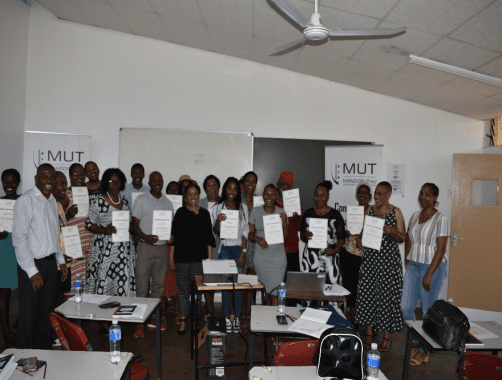
Agricultural Support Project (ASP)- Poultry (community training meeting)
- Ecosystem Rehabilitation and Restoration (ERR) project
Ecosystem Rehabilitation and Restoration project is one of the community-based research projects and student volunteer project. It focuses on identifying and rehabilitating ecosystem wetlands, providing environmental awareness to communities, upskilling interested youth of communities, and providing practical opportunities for Nature Conservation students.
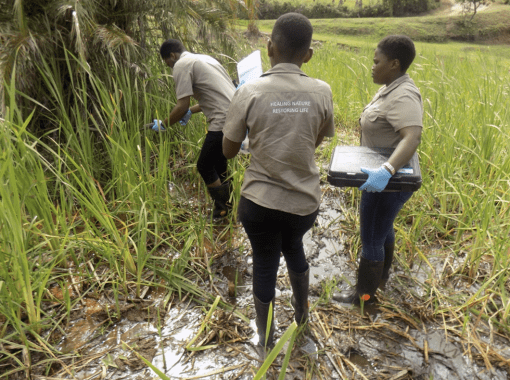
MUT Nature Conservation students in the field